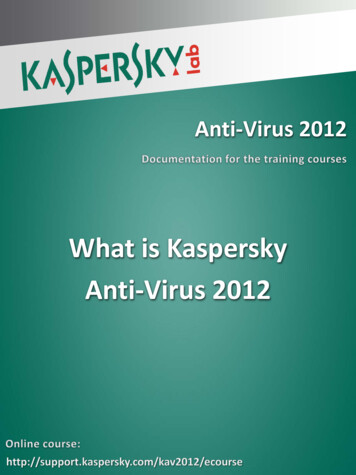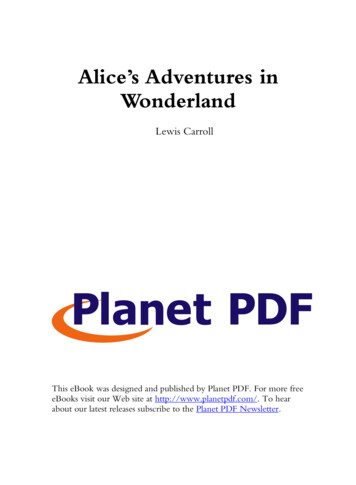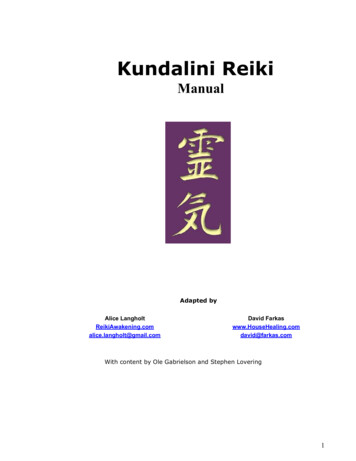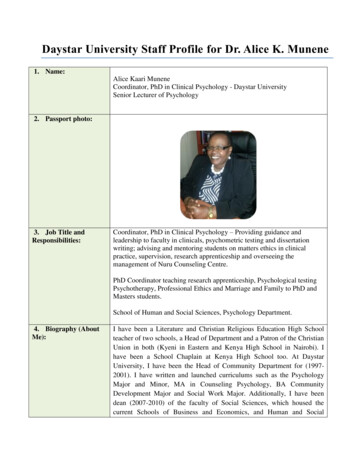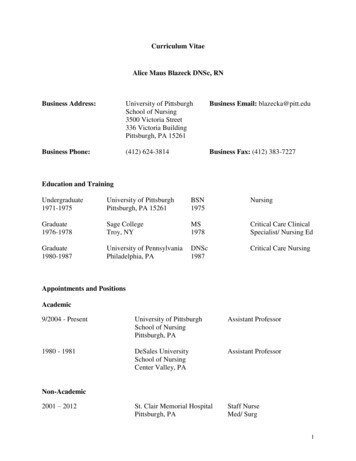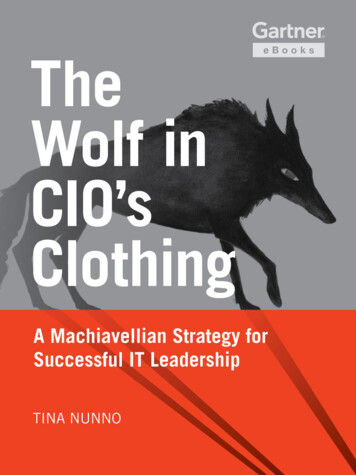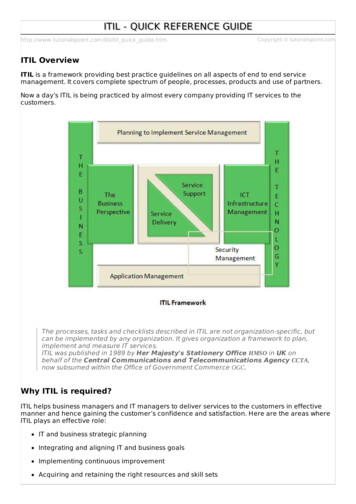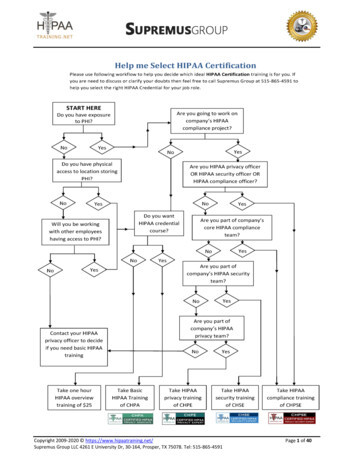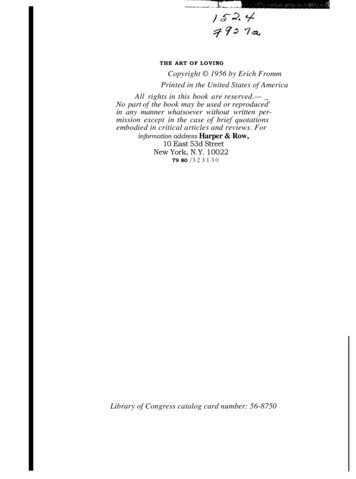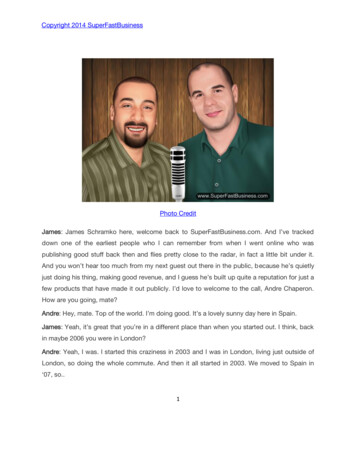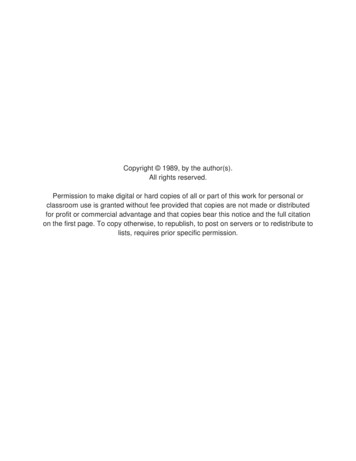
Transcription
CopyrightbyAlice Ruth Chu2003
The Dissertation Committee for Alice Ruth Chu Certifies that this is theapproved version of the following dissertation:Political TV Call-in Shows in Taiwan:Animating Crisis Discourses through Reported SpeechCommittee:Joel F. Sherzer, Co-SupervisorElizabeth L. Keating, Co-SupervisorAvron A. BoretzRoderick P. HartKeith WaltersQing Zhang
Political TV Call-in Shows in Taiwan:Animating Crisis Discourses through Reported SpeechbyAlice Ruth Chu, B.S., B.S., M.A.DissertationPresented to the Faculty of the Graduate School ofThe University of Texas at Austinin Partial Fulfillmentof the Requirementsfor the Degree ofDoctor of PhilosophyThe University of Texas at AustinMay, 2003
DedicationTo my father and life-long mentor,James Chi-ying Chu.To my mother and role model on how to do it all,Ruth Lin Chu.
AcknowledgementsI have many dissertation guardian angels and muses to thank who havecontributed their time, energy, and encouragement in helping me complete thisproject.First, I want to thank my parents, Ruth Lin Chu and James C. Y. Chu, fortheir emotional and financial support throughout my academic career. From theproofreading to the fact checking that my father provided as well as the carepackages of mantou (饅頭) and rousong (肉鬆) my mother mailed me in the finalstages of writing the dissertation, their dedication to my academic goals pervadethis dissertation. To my sister, Elaine, and my brother-in-law, Tristan, thank youfor the timely care package you sent the last week of the revising process; it wasgreatly appreciated and all the more so because it was from the two of you. Inaddition, I have “Grandma” Phyllis Bush to thank for being my first role modeland for helping me realize that women can and do earn Ph.D’s, have families,participate in community activities, and mentor “grandchildren” in the process. Atthe impressionable age of ten, you inspired me to join that special group andpursue that the academic lifestyle.As for the long but and rewarding dissertation path that started with thefirst day of graduate school and culminated with my defense, I wish to thank myadvisors, Dr. Joel Sherzer and Dr. Elizabeth Keating, for sharing their expertiseand knowledge throughout my graduate career at UT-Austin. Joel, I am blessed tohave experienced and reaped the benefits of your enthusiasm towards yourstudents and the linguistic anthropology program—from SALSA to fellowshipv
applications to the defense—I am grateful to have been your mentee. Withoutyour assistance, the funding and writing of this project would have been thatmuch more difficult. Elizabeth, your detailed readings and comments on eachdraft were especially helpful and greatly appreciated. You kept the dissertationfrom wandering down too many tangential paths and my work is all the better forit.Thank you, Dr. Keith Walters, for convincing me to pursue my graduatestudies at UT. The walk and conversation we shared from the anthropology to thelinguistics department during my first campus visit in the spring of 1994 left suchan impression on me that the choice was clear which program I wanted to be apart of, for which I am extremely grateful. I cherish what I have learned fromyour amazingly thorough and always engaging courses and aspire to achieve thesame balance in my own career one day. Most of all, I thank you for being my“Zen master.” Namely, you’ve shown me how to appreciate learning in its variousforms, from the academic to the popular, and from the big picture to the minutedetails.To Dr. Avron Boretz, thank you for keeping my fieldwork on track simplyby sharing your own experiences during a brief but invaluable conversation overlunch at a restaurant on Hsinhai Road (辛亥路) across the street from ICLP (a.k.a.Stanford Center) mid-way through my Taiwan sojourn. I especially valued yourpractical and wise advice that ranged from ethnographic field methods tolanguage learning to daily survival skills. Your wealth of knowledge about almostanything and everything written on Taiwan has made this dissertation all the morerigorous. I have so much more to I learn!Thank you, Dr. Roderick Hart, for introducing me to the compelling worldof political language and for inspiring me to find a way to link my ethnographicbased research with the field of communication studies. I am extremely grateful tovi
have experienced your contagious enthusiasm for teaching and research. Most ofall, thank you for reminding me why I entered graduate school and why I enjoyacademia.To Dr. Qing Zhang, thank you for joining my dissertation committee at theth11 hour. I appreciate your insightful feedback on the dissertation and, most ofall, for your timely arrival at UT when I most needed your knowledge andexpertise.I also wish to extend my appreciation to Dr. Sharon Jarvis for inviting meto her graduate seminar to present my preliminary research findings. Thank youfor taking the time out of your busy schedule to suggest dissertation outlines andto direct me toward talk show literature in the dissertation’s early stages.The collaborative nature of this dissertation, however, is best captured bymy incomparable and amazing dissertation group (a.k.a. “Chapter Three”), whichinclude my intrepid cohorts: Chris Labuski, Liz Lilliott, Jessica Montalvo, ApenRuiz, and Guha Shankar. As my writing companions, each of you unflagginglyencouraged me through half-written drafts and countless writing blocks. Yourdiverse talents as tarot card readers, massage therapists, gourmet chefs, do-it-allscholar-moms, and interpretive dancers also helped me realize (and appreciate)that we are truly more than the sum of our parts. It was/is your collective joie devivre, inspired sense of humor, and overall esprit de corps during our “work”meetings that made the dissertation writing experience so memorable andpriceless. Our 2002 AAA panel in New Orleans epitomized it all.To my other writing companions, I thank Elaine Chun, Chantal Tetreault,and Kristen Wilkerson for their assistance and feedback at various stages of thisproject. I particularly thank Mary Beltrán for her personal counsel regardingdissertation writing and post-dissertation life during our Town Lake walk-and-talksessions, not to mention her professional editing assistance on several chapters.Each of you contributed to the dissertation by writing with me at CC’s or JP’svii
Java, being my writing therapists over long phone calls, reading half-writtenchapters, and enjoying pizza and jazz at Cipollina. Thank you, my “writingmuses.”To my dear friends around the world, each of you have witnessed variousstages of this project and supported me in your own way. To my Taipei ICLPcolleagues, thank you Kara Britt, Shu-yuan Chen, Bianca Locsin, MadhaviSwamy-Peters, and Betsy Tao for sharing the language learning experience, andafterwards, your witty emails and phone calls on things scholarly and then some.To my Austin friends who helped this Northern Californian embraceCentral Texas as one of my many “homes,” thank you Anna Abbey-Diver, NestaAnderson, Denni Blum, Wai-fong Chiang, Huang Hoon Chng, Eric Dwyer,Risako Ide, Javier Léon, Heng-rue Lin, Cassandra Moore, Hari Kanta Ogren,Kieu Phan, Yukako Sunaoshi, Chiho Sunakawa, and MJ Wetherhead foraccompanying me in my eclectic Austin pursuits from taking UT fitness classes,making blueberry pancake runs to Kerbey Lane, trying new restaurants, watchingmovies like Harry Potter, and running road races from the Capital 10K to theMotorola Marathon.I also thank Sergio Acosta, Javier León, David McBride, Katie Sosnoff,and Mark Westmoreland, who provided invaluable technological assistancetowards the end of the dissertation in helping me capture, subtitle, and formatvideo clips from my call-in show data as well as rendering this missive into anelectronic format. I also thank Lauren Wagner for taping my dissertation defense,for which I will truly appreciate one day far into the future.To Dr. Mark Zetner, thank you for listening to my trials and tribulations aswell as commenting when needed. Through our meetings I’ve learned that writinga dissertation and taking care of oneself are inextricably interrelated.Of course, there wouldn’t have been any call-in shows to observe or writeabout without the assistance and cooperation of the staff and participants of 2100:viii
All People Open Talk and 8 o’clock Loud and Soft Voices. I particularly wish tothank Mr. Lee Tao and Mr. Yü Fu for welcoming me into their studios and officesas well as their production staffs for involving me in their daily routines while Iconducted my fieldwork. I am eternally grateful for the unprecedented experienceI had in having access to this truly remarkable group of people. I also wish tothank the staff at Always Speak Your Mind (有話老實講), Everybody Let’sDeliberate (大家來審判), Face-to-Face Debate (相對論), and Final Decision2000 (決戰 2000) for allowing me to observe their call-in programs early in myresearch process.In closing, I thank my best friend, Tim Johnson (江天), for keeping mefocused on my academic and personal goals by teaching me the art of multitasking. Our transnational vacations provided much needed respite from thedissertation as well as inspiration for finishing this project. From rallying mewhen my spirits were flagging during my fieldwork in Taipei to sustaining mymotivation when I returned to Austin, thank you for your consistent confidence inme from the moment we met. Do hsia li.ix
PrefaceWhile attending high school at the Taipei American School from 1984 to1986, I would occasionally meet my friends at the McDonald’s on Chung HsiaoEast Road (忠孝東路) in downtown Taipei a few minutes before an air raid drill,which the Nationalist Party-led government periodically orchestrated when thecountry was still under martial law in preparation for a possible military attackfrom China. As we waited out the hour-long mock exercise, which meant stayingoff the streets and remaining indoors, we would consume Chicken McNuggetsand French Fries as we surreptitiously kept watch for signs of anyone defying thegovernment’s ban on public mobility. In our rudimentary ethnographicobservations, no one ever did.In contrast, my experiences with McDonald’s during my ethnographicresearch in Taipei from 1998 to 2000 were decidedly not restricted to norassociated with air raid drills. Instead, I used the city’s ubiquitous McDonald’sestablishments as a rendezvous point where I would meet and interview various“local” informants who ranged from former Taipei City council members tocollege students to taxi drivers. Even the menu reflected the sign of the times as Ifound choices catering to Taiwanese taste buds in the form of “red tea” (hongcha紅茶) (a.k.a “black tea”), corn chowder soup (yumi tang 玉米湯), and teriyakichicken burgers.However, the event that best epitomized the Taiwanization of this U.S.based Golden Arches franchise in my eyes was its wildly successful Hello Kittypromotion in 1999. In an advertising coup that reflected how intimately RonaldMcDonald’s handlers had their finger(s) on Taiwan’s pop cultural pulse, the fastx
food chain offered the dynamic duo of Hello Kitty and her male friend (Daniel) atthe bargain price of NT 150 (approx. US 5) with each Happy Meal purchase(limited to one per customer, please). In the first promotion (there were twopromotions that offered five pairs of Hello Kitty and Daniel each time),1 avidcollectors-cum-consumers lined up the night before to ensure their share of thismarketing prize. Those who succeeded in purchasing this coveted product wouldlater showcase their trophy acquisitions in storefront display cases and the backwindows of their Honda Accords and BMWs. Thus, the McDonald’s I had knownin the mid-1980s as an escapist bunker during mock air raid drills had beentransformed in the late 1990s into a site for interviews on political call-in showsand where Taipei’s postmodern citizenry would queue up to buy Hello Kittys.Another contrast between the Taiwan I knew in the twilight of its martiallaw years and the democratizing nation-state I witnessed at the cusp of the 21stmillennium can be captured in the transformation of another space: Taipei’spublic buses. I recall the oppressive silence of these public bus rides, save forwhen my International friends and I were on board, at which point we were theonly ones speaking in this marked and potentially monitored public sphere.Today, silent bus rides are a part of Taiwan’s forgotten and discarded past asradios play to the driver’s station of choice, students talk loudly to each otheracross the length of the bus, and elderly patrons criticize bus drivers for their poordriving skills while the drivers retort by exhorting the same elderly patrons todisembark faster.As a final example, I provide a more subtle yet nonetheless significantcontrast of the Taipei of my teenage years and the cosmopolitan society I returned1 In the first promotion, Hello Kitty and Daniel were outfitted in different, ethnic attire. Forinstance, they would be dressed in traditional Japanese, Chinese, and Korean clothing. In thesecond promotion, the stuffed pair were dressed in Western wear and according to gendered rolessuch as a bride and groom or in 1950’s U.S. attire, with Hello Kitty in bobby socks and a poodleskirt and Daniel in a leather jacket and rolled up jeans.xi
to a decade later as a graduate student. While my mobility as a high schoolstudent was limited by parental curfews, the eminent threat came from myparents’ scoldings and the omnipresent gaze of the KMT-regime. Besides, therewere no 24-hour KTV (karoke) bars or MTV (movie rental) establishments topatron in the mid-1980s as there are today, and have been since the early 1990s.Yet when I returned in the summer of 1996 to pursue Mandarin language study,my mobility was again monitored by my parents, but no longer by the centralgovernment (which was still under KMT rule). Their exhortations that I takeprecautions in my pub
food chain offered the dynamic duo of Hello Kitty and her male friend (Daniel) at the bargain price of NT 150 (approx. US 5) with each Happy Meal purchase (limited to one per customer, please). In the first promotion (there were two promotions that offered five pairs of Hello Kitty and Daniel each time),1 avid
